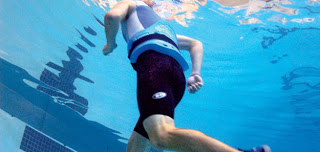Unfortunately, injuries are very common in connection with running. Two thirds of all runners are injured at least once a year and need to abstain from, or at least adjust their training. In this entry we try to investigate the reasons for that and we present possible preventive measures helping you avoid injuries.
Injuries are annoying. They often occur when you feel you are in an especially good shape or when you are in the middle of a preparatory phase for an important competition. However, injuries only very rarely are god-given and unavoidable matters of fact. There are specific measures that help preventing you from getting injured efficiently. Minimising injuries is an important base on which to build long term development and progression, as well as it helps to retain the joy of running. First, however, let’s try and get to the bottom of the problem. Consequently, the first question that we ask ourselves is:

Why are injuries so common among runners?
The simple answer is: Running involves a lot of stress for our body. Not only are the muscles used extensively, but through the steady lifting from and landing on the ground, even our bones, joints and tendons are exposed to strong forces. Those percussions affecting our body when running constitute the major difference between running and other endurance sports such as cycling, cross-country skiing or rowing. Often, awareness of this nature of running is not in place, especially when all goes well. However, humans are no machines. For running accordingly, a strong core and sensible preparation and follow-up of a training session are important. All of these factors are often not being paid enough attention however.
Furthermore, amount and/or intensity of training are often being increased too quickly. Especially after a break it is crucial to work your way back to the previous level step by step. Wanting to catch up the training you missed often results in a further breakdown. In order to improve steadily, to increase the amount of training, or to run more quickly, two factors are of major importance: time and patience. This is something that a lot of runners lack in.
Along with excessive training loads, insufficient measures of recovery, such as imbalanced nutrition, too little hours of sleep, not enough stretching or using of a foam roll increase the risk of injury. Furthermore, a lot of recreational athletes often have an insufficient muscular stability or a bad running style. In that case, starting to train for a marathon is very likely to result in an injury rather quickly. Inappropriate or too old footwear is a further source of increased risk of injury.
A lot of times the amount of kilometers is more important to athletes than complementary components of training such as strength training or recovery.

How can I, as an athlete, prevent myself from getting injured?
Apart from the most important piece of advice, to only gradually increase the amount and intensity of your running training, the following factors should be borne in mind:
- Regular strength training, especially for the core. This is a must for each and every runner.
- Enough hours of sleep
- Balanced nutrition
- Warming up and cooling down, especially before and after intense sessions.
- Regular stretching
- Appropriate equipment – we strongly recommend that you get your running shoes in specialised shops where they can consult you accordingly
- Drills and running style. Economic running minimises the risk of injury.
- Bring some variation into the monotony of running (i.e. cycling, aqua-jogging, swimming, cross-country skiing)
In general, running.COACH supports you in finding the right dose and avoiding a “too much” or “too fast”, by providing you with an elaborated training plan. Stretching, strength training and drills, as well as nutrition tips are supplied by running.COACH additionally.

How should I behave in case of emerging pain?
Pain is a signal that absolutely needs to be taken seriously. It is crucial that you react and don’t just ignore the pain, thinking that it shouldn’t be anything severe. Because this is when minor complaints can turn into serious injuries. With minor ailments it is recommendable that you conduct the running training you have originally planned in the water instead. Go and do aqua-jogging for example. Very often a couple of rest days or/and a reduced amount of running suffice to make the pain disappear. Remember: Resting is an essential part of your training! If the pain is strong and doesn’t die away, however, it is inevitable that you go see a doctor.
